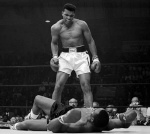Football in the Middle East After the Arab Spring
+3
la bestia negra
Great Leader Sprucenuce
RealGunner
7 posters
Page 1 of 1
 Football in the Middle East After the Arab Spring
Football in the Middle East After the Arab Spring
After deposing their dictators successfully, where does the future of Tunisia, Egypt and Libya's football lie?
On December 17, 2010 in Tunisia, a man working as a street vendor who has been complaining about work abuse and harassment from his employers finally had enough. 26 year old Mohammed Bouazizi, fed up with the constant torment and abuse, lit himself on fire, a move that would forever change not only Tunisia, but the whole Middle East. This sacrifice sparked what many label as the “Arab Spring”. This “spring” has not only affected the political landscape in the region, but has also impact on the region’s most popular sport: football. This article will cover the state of football in the three countries which has managed to successfully depose their dictators- Tunisia, Egypt and Libya.
The country where it all began, Tunisia, began their protests and revolt against the long time, 23 year rule of Zine El Abidine Ben Ali, on December 20, 2010, three days after Bouazizi lit himself on fire. The country and its people, just like most nations in the Middle East, have long suffered from government corruption, oppression, lack of freedoms and rights, tyranny, human rights violations, sectarianism and poverty. Tunisians led with peaceful protests denouncing Ben Ali’s authoritative regime which was littered with corruption, high unemployment rates and food inflation. The protests were met with violent response from the government’s forces, causing the death of around 300 lives and injuring thousands more. Despite the violence and bloodshed, Tunisia’s perseverance, sacrifice, patience and bravery paid off on January 14, 2011 when it was announced that Ben Ali fled the country, ending his 23 year rule.
Tunisia have an illustrious football history, winning the African Cup Of Nations in 2004 against Morocco and getting the runners-up place twice in 1965 and 1996. They have appeared in the World Cup four times, with their last appearance in Germany in 2006. The country is home to one of Africa’s biggest clubs in Esperance, who’ve won the CAF Champions League on two occasions in 1994 and last edition’s tournament in 2011. The country and this club in particular, have had some great players gracing the pitch over the years, especially Tarek Dhiab, who you might’ve noticed through his job as a football analyst for Al Jazeera Sports and who is arguably the country’s greatest ever player, winning the African Player Of The Year in 1977 and was named as Tunisia’s Player Of The Century.
Despite the country’s success on the football pitch, the football federation during Ben Ali’s era has long been riddled with controversy. The FTF (Tunisia’s Football Federation) was founded in 1957 and joined both FIFA and CAF on the same year in 1960. The federation have been accused with allegations of government meddling and interference (sports federation presidents couldn’t be elected without the blessing of the ruling party in government), especially regarding the reign of controversial president Ali Hafsi. Hafsi’s reign was littered with allegations of corruption, match fixing and vote rigging which many believe got him the position in the first place. These claims were widely supported by retired Tunisian footballers, including the aforementioned Tarek Dhiab and Othman Jenayah, and his opponent in the last elections, Ridha Ayed. These claims and allegations forced him to resign on April 6, 2011, ending his tumultuous rule as head of the nation’s football federation with Anwar Haddad taking over.
The revolution has helped in gaining some form of democracy, especially in the way clubs conduct themselves. Club Africain, one of Tunisia’s biggest clubs, became the first club to democratically elect their president with Club Atletique Benzertin following suit. Competitions like the African Championship Of Nations (CHAN), which were underestimated and undervalued by the federation during Ben Ali’s rule, are being taken seriously with the national side winning this year’s tournament in Sudan. The national side have also managed to qualify to the Cup of Nations against the odds, and will be in a group alongside Gabon, Niger and Morocco.
Football has played a part in the revolution, not only in promoting democracy, but also in being the scene in which protests against the government actually began in 2005. During the Tunisian Cup final that year, fans shouted anti- Ben Ali slogans and insulted the former Tunisian leader’s son, Chiboub, who attended the match and was forced to leave prematurely, which shows that the sport did play a role in ending a totalitarian regime.
Now heading to Egypt, where the national side was going through a golden period in their football history, winning three African Cup of Nations tournaments on the bounce in 2006, 2008 and 2010. Al Ahly, the most successful club in the country with 35 league titles, were dominating Africa’s biggest club competition in the CAF Champions League winning the title in 2005, 2006 and 2008. During this period, players like Mohammed Abou-Trika, Ahmed Hassan, Amr Zaki, Hosny Abd-Rabou, Wael Gomaa and Essam El-Hadary became household names and were revered and idolized. Their success and dominance helped Egypt reach an unprecedented 9th place in the FIFA rankings on July 2010, their highest ever since they joined FIFA in 1923, two years after their federation was established in 1921. The sport, unfortunately, was used as a political tool for the deposed Hosni Mubarak regime, where he used to occasionally show up in the Cairo International Stadium to watch a match, hand out medals and congratulate players in order to gain support of the people and popularity. Mubarak also used the media to his benefit, with a huge example in the way he instigated a media war against Algeria, which stoked up the rivalry to unprecedented levels, deeply effecting relations between the two countries. Clubs in Egypt are also mostly under government and military ownership, who also interfere and are involved in the way the domestic league is run.
Then came the turning point on January 25, 2011, after the success of the Tunisian revolution, Egypt revolted and began their revolution to end the 30 year regime of Hosni Mubarak. The uprising affected the sport in the country, with many high-profile and highly-paid players like Mohammed Abou-Trika and Ahmed Hassan staying silent, while national team manager Hassan Shehata and the well known and controversial former player Hossam Hassan, siding with the regime actively leading pro-Mubarak protests where he suggested that they should “cut off the water supply” in order to disperse the protestors in Tahrir Square. Other well known players like the aforementioned Essam El-Hadary, Mido, Wael Gomaa, and Chikabala also joined the pro-Mubarak rallies. There were even allegations that the National team’s goalkeeping coach, Ahmed Soliman, joined in the torturing of prisoners. Despite the siding of many high-profile players and figures in the sport with the regime, there were players like Nader El-Sayed and Islam El-Shater leading the anti-government protests and chanting slogans against Mubarak.
Ultras from the two most popular clubs in the country and fierce rivals, Al Ahly and Zamalek, stepped aside their differences and united with each other, joining the protests and played a crucial role in protecting the protestors and fighting back the security forces. After 18 days of protests, sacrifice and bloodshed in which hundreds of protestors were killed and thousands more injured, on the 11th of February 2011, Hosni Mubarak finally stepped down and resigned from office.
Despite the success of the revolution, problems still exist within the new government as protests are still ongoing to topple the military regime in the country, a regime which still contains figures from Mubarak’s regime especially Mohammed Al- Tantawy. The Ultras are still playing a key role in leading the protests and in fighting the security forces, which has of course, caused tensions between them and the government, leading them to take decisions of enforcing teams to play football matches behind closed doors and continuous match postponements. These decisions were made in hope that it can weaken the Ultras’ influence in the protests, where they’ve also used matches as a way to shout out slogans and display banners in opposition of the regime, which caused the suspension of Interior Minister Osama Haikal for broadcasting protests by football fans against the EFA (Egypt’s Football Federation) during a match. Egypt’s have also failed to qualify to the African Cup of Nations, relinquishing their title in the process.
Finally Libya, a nation which endured a tumultuous 42 years reign under the control of the eccentric, authoritative and tyrannical Muammar Gadaffi. Libya hasn’t achieved much success in football, ever since their federation was founded in 1962, joining FIFA in 1964 and CAF a year later in 1965. Their best achievement is of course in 1982, when they reached the final of the African Cup of Nations as the host which they lost in a penalty shootout against Ghana. The national side managed to qualify to the tournament one other time and that was in 2006 in Egypt, where they got knocked out in the first round. The sport in the country was mainly revolved around one man and that man is one of the sons of Muammar Gadaffi, Al Saadi Gadaffi. Saadi made football into an area of confrontation, forced Al Ahli Benghazi, one of the country’s biggest clubs, to get relegated to the second division after its fans chanted slogans and obscenities against during a football match. Many of its fans were arrested, some were even sentenced to life in prison, and the club’s headquarters was also burnt to the ground. Libyan broadcasters could only refer to players by the numbers on their jersey, except for Saadi to ensure a degree of anonymity. He was also involved in fixing matches in his favor and allegedly was involved in the murder of famous player and national team coach, Bashar Riyan in 2005, who was known for vocally speaking out against the Gadaffi regime, particularly Saadi, which displayed how much he wanted the sport to revolve around him and nobody else.
The revolution which began on February 15, 2011, as expected, completely changed the country, especially the sport. Many players, who play for the national side, joined the rebels and the liberation movement to end Gadaffi’s long time reign, and which also resulted in Libya surrendering their right to host the 2013 African Cup of Nations to South Africa. Players like Ahmed Al Sqayer, who was shot in the arm while in battle fighting Gadaffi’s mercenaries, and Walid Al Katroushi also made the decision to fight alongside the rebels and this is why, “When I joined the rebels, I forgot about football. I changed my clothes. I shaved my hair. I forgot everything, even my family.” Football was no longer important; it was the liberation and the independence of Libya away from Gadaffi’s hands which was what on almost every Libyan’s mind. Some of course, decided not to fight and fled to neighboring countries.
Despite the issues, Libya’s national side continued with their qualifying campaign alongside their manager, Marcos Paqueta, who paid for his own ticket to attend matches. Their first game since their revolution began was against Mozambique and was held in Egypt on September 3, 2011. The national side played under the red, green and black revolutionary flag for the first time. Libya was victorious, winning the match 1-0 and which in turn, helped the team gain qualification to the African Cup of Nations against all odds. Libya will be in a group alongside Guinea, Senegal and Zambia. The team will rely on star goalkeeper and newly appointed captain, Samir Aboud, who has been nominated for African Player of the Year.
source
On December 17, 2010 in Tunisia, a man working as a street vendor who has been complaining about work abuse and harassment from his employers finally had enough. 26 year old Mohammed Bouazizi, fed up with the constant torment and abuse, lit himself on fire, a move that would forever change not only Tunisia, but the whole Middle East. This sacrifice sparked what many label as the “Arab Spring”. This “spring” has not only affected the political landscape in the region, but has also impact on the region’s most popular sport: football. This article will cover the state of football in the three countries which has managed to successfully depose their dictators- Tunisia, Egypt and Libya.
The country where it all began, Tunisia, began their protests and revolt against the long time, 23 year rule of Zine El Abidine Ben Ali, on December 20, 2010, three days after Bouazizi lit himself on fire. The country and its people, just like most nations in the Middle East, have long suffered from government corruption, oppression, lack of freedoms and rights, tyranny, human rights violations, sectarianism and poverty. Tunisians led with peaceful protests denouncing Ben Ali’s authoritative regime which was littered with corruption, high unemployment rates and food inflation. The protests were met with violent response from the government’s forces, causing the death of around 300 lives and injuring thousands more. Despite the violence and bloodshed, Tunisia’s perseverance, sacrifice, patience and bravery paid off on January 14, 2011 when it was announced that Ben Ali fled the country, ending his 23 year rule.
Tunisia have an illustrious football history, winning the African Cup Of Nations in 2004 against Morocco and getting the runners-up place twice in 1965 and 1996. They have appeared in the World Cup four times, with their last appearance in Germany in 2006. The country is home to one of Africa’s biggest clubs in Esperance, who’ve won the CAF Champions League on two occasions in 1994 and last edition’s tournament in 2011. The country and this club in particular, have had some great players gracing the pitch over the years, especially Tarek Dhiab, who you might’ve noticed through his job as a football analyst for Al Jazeera Sports and who is arguably the country’s greatest ever player, winning the African Player Of The Year in 1977 and was named as Tunisia’s Player Of The Century.
Despite the country’s success on the football pitch, the football federation during Ben Ali’s era has long been riddled with controversy. The FTF (Tunisia’s Football Federation) was founded in 1957 and joined both FIFA and CAF on the same year in 1960. The federation have been accused with allegations of government meddling and interference (sports federation presidents couldn’t be elected without the blessing of the ruling party in government), especially regarding the reign of controversial president Ali Hafsi. Hafsi’s reign was littered with allegations of corruption, match fixing and vote rigging which many believe got him the position in the first place. These claims were widely supported by retired Tunisian footballers, including the aforementioned Tarek Dhiab and Othman Jenayah, and his opponent in the last elections, Ridha Ayed. These claims and allegations forced him to resign on April 6, 2011, ending his tumultuous rule as head of the nation’s football federation with Anwar Haddad taking over.
The revolution has helped in gaining some form of democracy, especially in the way clubs conduct themselves. Club Africain, one of Tunisia’s biggest clubs, became the first club to democratically elect their president with Club Atletique Benzertin following suit. Competitions like the African Championship Of Nations (CHAN), which were underestimated and undervalued by the federation during Ben Ali’s rule, are being taken seriously with the national side winning this year’s tournament in Sudan. The national side have also managed to qualify to the Cup of Nations against the odds, and will be in a group alongside Gabon, Niger and Morocco.
Football has played a part in the revolution, not only in promoting democracy, but also in being the scene in which protests against the government actually began in 2005. During the Tunisian Cup final that year, fans shouted anti- Ben Ali slogans and insulted the former Tunisian leader’s son, Chiboub, who attended the match and was forced to leave prematurely, which shows that the sport did play a role in ending a totalitarian regime.
Now heading to Egypt, where the national side was going through a golden period in their football history, winning three African Cup of Nations tournaments on the bounce in 2006, 2008 and 2010. Al Ahly, the most successful club in the country with 35 league titles, were dominating Africa’s biggest club competition in the CAF Champions League winning the title in 2005, 2006 and 2008. During this period, players like Mohammed Abou-Trika, Ahmed Hassan, Amr Zaki, Hosny Abd-Rabou, Wael Gomaa and Essam El-Hadary became household names and were revered and idolized. Their success and dominance helped Egypt reach an unprecedented 9th place in the FIFA rankings on July 2010, their highest ever since they joined FIFA in 1923, two years after their federation was established in 1921. The sport, unfortunately, was used as a political tool for the deposed Hosni Mubarak regime, where he used to occasionally show up in the Cairo International Stadium to watch a match, hand out medals and congratulate players in order to gain support of the people and popularity. Mubarak also used the media to his benefit, with a huge example in the way he instigated a media war against Algeria, which stoked up the rivalry to unprecedented levels, deeply effecting relations between the two countries. Clubs in Egypt are also mostly under government and military ownership, who also interfere and are involved in the way the domestic league is run.
Then came the turning point on January 25, 2011, after the success of the Tunisian revolution, Egypt revolted and began their revolution to end the 30 year regime of Hosni Mubarak. The uprising affected the sport in the country, with many high-profile and highly-paid players like Mohammed Abou-Trika and Ahmed Hassan staying silent, while national team manager Hassan Shehata and the well known and controversial former player Hossam Hassan, siding with the regime actively leading pro-Mubarak protests where he suggested that they should “cut off the water supply” in order to disperse the protestors in Tahrir Square. Other well known players like the aforementioned Essam El-Hadary, Mido, Wael Gomaa, and Chikabala also joined the pro-Mubarak rallies. There were even allegations that the National team’s goalkeeping coach, Ahmed Soliman, joined in the torturing of prisoners. Despite the siding of many high-profile players and figures in the sport with the regime, there were players like Nader El-Sayed and Islam El-Shater leading the anti-government protests and chanting slogans against Mubarak.
Ultras from the two most popular clubs in the country and fierce rivals, Al Ahly and Zamalek, stepped aside their differences and united with each other, joining the protests and played a crucial role in protecting the protestors and fighting back the security forces. After 18 days of protests, sacrifice and bloodshed in which hundreds of protestors were killed and thousands more injured, on the 11th of February 2011, Hosni Mubarak finally stepped down and resigned from office.
Despite the success of the revolution, problems still exist within the new government as protests are still ongoing to topple the military regime in the country, a regime which still contains figures from Mubarak’s regime especially Mohammed Al- Tantawy. The Ultras are still playing a key role in leading the protests and in fighting the security forces, which has of course, caused tensions between them and the government, leading them to take decisions of enforcing teams to play football matches behind closed doors and continuous match postponements. These decisions were made in hope that it can weaken the Ultras’ influence in the protests, where they’ve also used matches as a way to shout out slogans and display banners in opposition of the regime, which caused the suspension of Interior Minister Osama Haikal for broadcasting protests by football fans against the EFA (Egypt’s Football Federation) during a match. Egypt’s have also failed to qualify to the African Cup of Nations, relinquishing their title in the process.
Finally Libya, a nation which endured a tumultuous 42 years reign under the control of the eccentric, authoritative and tyrannical Muammar Gadaffi. Libya hasn’t achieved much success in football, ever since their federation was founded in 1962, joining FIFA in 1964 and CAF a year later in 1965. Their best achievement is of course in 1982, when they reached the final of the African Cup of Nations as the host which they lost in a penalty shootout against Ghana. The national side managed to qualify to the tournament one other time and that was in 2006 in Egypt, where they got knocked out in the first round. The sport in the country was mainly revolved around one man and that man is one of the sons of Muammar Gadaffi, Al Saadi Gadaffi. Saadi made football into an area of confrontation, forced Al Ahli Benghazi, one of the country’s biggest clubs, to get relegated to the second division after its fans chanted slogans and obscenities against during a football match. Many of its fans were arrested, some were even sentenced to life in prison, and the club’s headquarters was also burnt to the ground. Libyan broadcasters could only refer to players by the numbers on their jersey, except for Saadi to ensure a degree of anonymity. He was also involved in fixing matches in his favor and allegedly was involved in the murder of famous player and national team coach, Bashar Riyan in 2005, who was known for vocally speaking out against the Gadaffi regime, particularly Saadi, which displayed how much he wanted the sport to revolve around him and nobody else.
The revolution which began on February 15, 2011, as expected, completely changed the country, especially the sport. Many players, who play for the national side, joined the rebels and the liberation movement to end Gadaffi’s long time reign, and which also resulted in Libya surrendering their right to host the 2013 African Cup of Nations to South Africa. Players like Ahmed Al Sqayer, who was shot in the arm while in battle fighting Gadaffi’s mercenaries, and Walid Al Katroushi also made the decision to fight alongside the rebels and this is why, “When I joined the rebels, I forgot about football. I changed my clothes. I shaved my hair. I forgot everything, even my family.” Football was no longer important; it was the liberation and the independence of Libya away from Gadaffi’s hands which was what on almost every Libyan’s mind. Some of course, decided not to fight and fled to neighboring countries.
Despite the issues, Libya’s national side continued with their qualifying campaign alongside their manager, Marcos Paqueta, who paid for his own ticket to attend matches. Their first game since their revolution began was against Mozambique and was held in Egypt on September 3, 2011. The national side played under the red, green and black revolutionary flag for the first time. Libya was victorious, winning the match 1-0 and which in turn, helped the team gain qualification to the African Cup of Nations against all odds. Libya will be in a group alongside Guinea, Senegal and Zambia. The team will rely on star goalkeeper and newly appointed captain, Samir Aboud, who has been nominated for African Player of the Year.
source

RealGunner- Admin

- Club Supported :

Posts : 89517
Join date : 2011-06-05
 Re: Football in the Middle East After the Arab Spring
Re: Football in the Middle East After the Arab Spring
You wont believe how many times this has appeared in my twitter timeline 

Great Leader Sprucenuce- Forum Legend

- Club Supported :

Posts : 68989
Join date : 2011-06-05
Age : 34
 Re: Football in the Middle East After the Arab Spring
Re: Football in the Middle East After the Arab Spring
i was one of the retweeters 

RealGunner- Admin

- Club Supported :

Posts : 89517
Join date : 2011-06-05
 Re: Football in the Middle East After the Arab Spring
Re: Football in the Middle East After the Arab Spring
as for tunisia i heard there will be a stadium renamed as a tribute to
mohamed bouazizi
mohamed bouazizi

la bestia negra- First Team

- Club Supported :

Posts : 2548
Join date : 2011-12-14
 Re: Football in the Middle East After the Arab Spring
Re: Football in the Middle East After the Arab Spring
Immaculate_Mole wrote:You wont believe how many times this has appeared in my twitter timeline


Sina- Fan Favorite

- Club Supported :

Posts : 9671
Join date : 2011-06-05
Age : 33
 Re: Football in the Middle East After the Arab Spring
Re: Football in the Middle East After the Arab Spring
Aren't Tunisia, Egypt and Libya all in Africa? 


BarrileteCosmico- Admin

- Club Supported :

Posts : 28384
Join date : 2011-06-05
Age : 34
 Re: Football in the Middle East After the Arab Spring
Re: Football in the Middle East After the Arab Spring
BarrileteCosmico wrote:Aren't Tunisia, Egypt and Libya all in Africa?
Yes, but they are still considered Arab.

EarlyPrototype- Fan Favorite

- Club Supported :

Posts : 7700
Join date : 2011-06-05
 Re: Football in the Middle East After the Arab Spring
Re: Football in the Middle East After the Arab Spring
but not Middle East, which was my point...

BarrileteCosmico- Admin

- Club Supported :

Posts : 28384
Join date : 2011-06-05
Age : 34
 Re: Football in the Middle East After the Arab Spring
Re: Football in the Middle East After the Arab Spring
BarrileteCosmico wrote:Aren't Tunisia, Egypt and Libya all in Africa?
yes but still considerd arab countries

la bestia negra- First Team

- Club Supported :

Posts : 2548
Join date : 2011-12-14
 Re: Football in the Middle East After the Arab Spring
Re: Football in the Middle East After the Arab Spring
It is part of the middle east. North Africa is part of it.

EarlyPrototype- Fan Favorite

- Club Supported :

Posts : 7700
Join date : 2011-06-05
 Re: Football in the Middle East After the Arab Spring
Re: Football in the Middle East After the Arab Spring
there is no such thing as the middle east
were half-asian half african
were half-asian half african

la bestia negra- First Team

- Club Supported :

Posts : 2548
Join date : 2011-12-14
 Re: Football in the Middle East After the Arab Spring
Re: Football in the Middle East After the Arab Spring
BarrileteCosmico wrote:but not Middle East, which was my point...
There's more than one interpretation to the Middle East. Some people include the Eastern countries like Afghanistan and such + the Gulf countries. Other people say the ME's made up of the Gulf countries + North Africa, and I think that interpretation is more common.

7amood11- First Team

- Club Supported :

Posts : 3113
Join date : 2011-06-05
 Re: Football in the Middle East After the Arab Spring
Re: Football in the Middle East After the Arab Spring
BTW, I'm still amazed that we managed to do well in our last 2 ACN qualifying matches even though the NT didn't play or train for months. Beat Mozambique 1-0 and drew with Zambia 1-1. Hopefully we do well during the ACN.

7amood11- First Team

- Club Supported :

Posts : 3113
Join date : 2011-06-05
 Similar topics
Similar topics» Arab Football Teams
» If you woke up as an oiled Arab
» Palermo close on €200m Arab investment
» Arturo Vidal: Today ugly football [Atletico] played against the best football [Bayern] in the world. In football not always the best team wins. Atletico aren't the rightful finalists.
» Spring beat Juventus 2-1 to Botafogo and eliminated from the Tyrrhenian Sea and Sport. Gabriel scored
» If you woke up as an oiled Arab
» Palermo close on €200m Arab investment
» Arturo Vidal: Today ugly football [Atletico] played against the best football [Bayern] in the world. In football not always the best team wins. Atletico aren't the rightful finalists.
» Spring beat Juventus 2-1 to Botafogo and eliminated from the Tyrrhenian Sea and Sport. Gabriel scored
Page 1 of 1
Permissions in this forum:
You cannot reply to topics in this forum







» The TV Series Thread - Part 5
» Premier League 2024/25
» GL NBA fantasy 24-25
» The Official Real Madrid Matchday Thread 24 - 25
» Ruben Amorim Sack Watch
» La Liga 2024/25
» Raphinha's Ballon d'Or campaing
» Political Correctness, LGBTQ, #meToo and other related topics
» Hansi Flick Sack Watch
» Miguel "Miguelito" Gutierrez
» S.T.A.L.K.E.R. 2: Heart of Chornobyl
» Mbappe signs for Real Madrid.